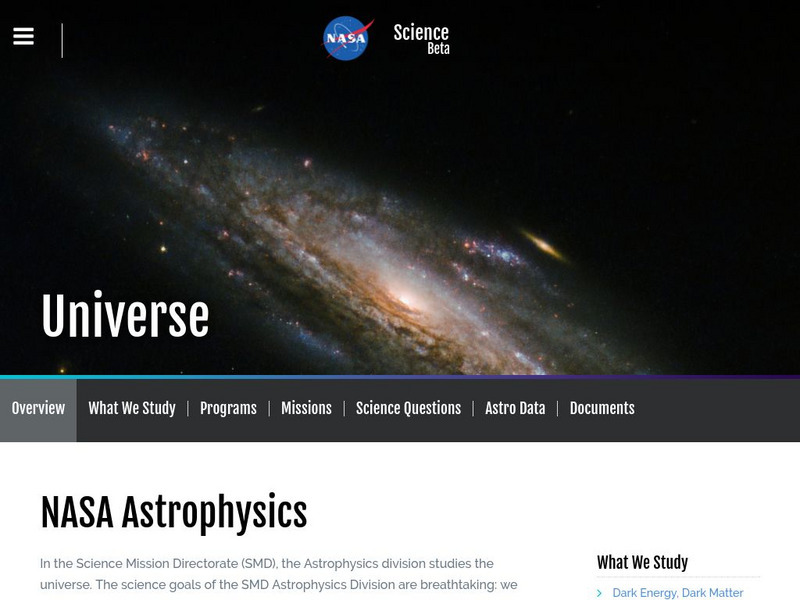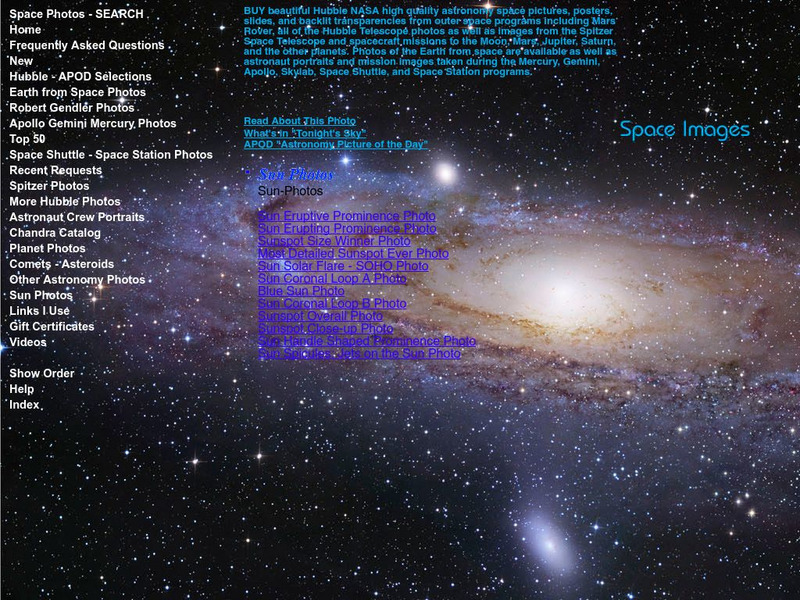PBS
Pbs Teachers: Life's Really Big Questions: Planetary Problem Solving
Explore the possibility of life on planets outside our solar system. Create an extrasolar planet, then make the necessary adaptations for it to be capable of supporting human life.
Smithsonian Institution
National Postal Museum: Art of the Stamp: First Man on the Moon
View the artwork of Paul Calle as he designed the stamp honoring the first man on the moon. Read about the inspiring story that lead to the making of this stamp.
NASA
Nasa: Starlight Riddle
This site from NASA provides an interestinnng approach to telescopes. "Almost all telescopes nowadays use mirrors, not lenses, to gather and focus the light from celestial objects. We have just seen, though, that mirrors reverse the...
NASA
Nasa: Astrophysics
This colorful study looks at how our universe was formed and how others can be formed. It also contains beautiful images of various formations in our own universe.
Famous Scientists
Famous Scientists: Maria Mitchell
Learn about the life and discovery of Maria Mitchell in this article.
TeachEngineering
Teach Engineering: A Roundabout Way to Mars
Students explore orbit transfers and, specifically, Hohmann transfers. They investigate the orbits of Earth and Mars by using cardboard and string. Students learn about the planets' orbits around the sun, and about a transfer orbit from...
Read Works
Read Works: Living on the Moon
[Free Registration/Login Required] An informational text that asks the reader to make predictions about visits to the moon. A question sheet is available to help students build skills in reading comprehension.
Harvard University
Micro Observatory Robotic Telescope Network: Explore the Universe
This website introduces you to the MicroObservatory Robotic Telescope Network operated by the Harvard-Smithsonian Center for Astrophysics. Links and resources for both teachers and students are included.
NASA
NASA Kids Club: Rocket Builder
Students can hone their shape-recognition skills and use the plans to build a fleet of rockets.
Khan Academy
Khan Academy: The Effects of Microgravity on Muscle Tissues
This is a five-question quiz pertaining to the passage "The effects of Microgravity on muscle tissues."
American Museum of Natural History
American Museum of Natural History: Piloting Red Rover
Do you have what it takes to drives a robot on Mars?
Other
Space Images
Discover brilliant, ominous images of our solar system from space exploration's cutting edge technology. Although this is a commercial site that sells these images, they are still educational and fun to look at.
NASA
Kennedy Space Center: Skylab Operations Summary
This article has a summary of the Skylab mission, including specs on many aspects of the mission.
Curated OER
Vibrationdata.com: Animal Astronauts
Information about some of the early animal astronauts who were launched into space to help determine the effects of space travel on human beings.
Curated OER
Vibrationdata.com: Animal Astronauts
Information about some of the early animal astronauts who were launched into space to help determine the effects of space travel on human beings.
Curated OER
Vibrationdata.com: Animal Astronauts
Information about some of the early animal astronauts who were launched into space to help determine the effects of space travel on human beings.
Curated OER
Vibrationdata.com: Animal Astronauts
Information about some of the early animal astronauts who were launched into space to help determine the effects of space travel on human beings.
Curated OER
Vibrationdata.com: Animal Astronauts
Information about some of the early animal astronauts who were launched into space to help determine the effects of space travel on human beings.
Curated OER
See Explanation. Clicking on the Picture Will Download
This site presents a brief overview and newspaper clip documenting the first manned space mission. Soviet cosmonaut Yuri Alexseyevich Gagarin became the first human in space on April 12, 1961.
Curated OER
Capt. Iven Kincheloe, With the X 2 Rocket Research Plane.
Use this site to learn all about the first man to reach the edge of space, paving the way for the space exploration program. Related links available.
Curated OER
A Bell X 2 Drops Away From Its Boeing B 50 Mothership.
Use this site to learn all about the first man to reach the edge of space, paving the way for the space exploration program. Related links available.
Curated OER
Capt. Iven Kincheloe
Use this site to learn all about the first man to reach the edge of space, paving the way for the space exploration program. Related links available.
Curated OER
Capt. Iven Kincheloe, in the Cockpit of an F 104 Fighter.
Use this site to learn all about the first man to reach the edge of space, paving the way for the space exploration program. Related links available.
Curated OER
Star Birth
The Hubble Space Telescope has provided the world with incredible information that has helped formulate our knowledge of the universe. This telescope will soon be retired and replaced by a newer, more powerful telescope. Read about the...









